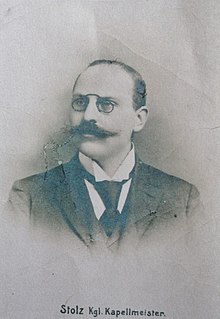Leopold pride
Leopold Jacob Stolz (born September 8, 1866 in Graz , † September 7, 1957 in Lohr am Main ) was an Austrian composer and conductor .
Life
Leopold Stolz was the son of the conductor and music teacher Jakob Stolz (1832-1919) and the pianist Ida Carolina Bondy , married Stolz (1841-1903). He received his musical training first from his father, then from Carl Reinecke and Simon Jadassohn at the Leipzig Conservatory . Leopold Stolz was subsequently employed as a theater conductor in Karlsbad , Berlin and at the Hessian State Theater in Wiesbaden . Leopold Stolz, who was on friendly terms with Ferruccio Busoni and Joseph Marx, had also been employed as a solo répétiteur at the Bayreuth Festival since 1899 . After losing his property with almost all of his compositions at the end of the Second World War , ten compositions were saved, he moved to Lohr am Main, where he died in 1957 one day before his 91st birthday.
His first marriage on May 8, 1894 to the opera singer Aloisia Karetta (1869–1938) had three children; his second marriage on May 28, 1940, Charlottenburg to Marie Auguste Schönicke (1890–1943) remained childless. From the third and last marriage (September 5, 1946) to Anna-Maria Anny Zöpf, there were two daughters and one son: the youngest daughter Rosalinde († 2019), Margarete Stolz-Wreford (* 1947) and Robert Stolz. The widow Anny Stolz died in Fürstenfeldbruck in 2004. He left his autobiography to his children, the original is in the possession of Mrs. M. Stolz-Wreford.
In his memoir Ein Vergessener v. Leopold Stolz's changeful fate has been written down for his descendants.
Leopold Stolz was the brother of Robert Stolz , Maximilian Stolz, Susanne Stolz, Pauline Prochaska, Maria Lesky and Elisabeth Giurco.
His compositional work includes orchestral works such as the overture Das Leben ein Traum , songs of the dead, piano music and the opera Waldmärchen based on a text by Paul Busson, which premiered in Graz in 1923 .
Works
- Two songs: No. I Adagio , text Elsa Zimmermann, No. II Into the distance , text by Karl Stieler. For a voice with accompaniment from the pianoforte
- Two songs: No. I The lake of dreams , text by Prince Emil v. Schönaich-Carolath , No. II Herbstzeitlose . For baritone or mezzo-soprano with accompaniment ds. Pianoforte
- Two songs: No. I From the Stars , text by Karl Stieler, No. II Nocturnal Paths . For soprano or tenor with accompaniment of the pianoforte.
- Souvenir de Monrepos: 3 character pieces for pianoforte for two hands.
- Einsiedel , text by Karl Bulke. Song for one voice with accompaniment of the pianoforte.
- On the way , text by Emanuel von Bodmann. Song for one voice with accompaniment of the pianoforte
- The mossy pike , text by Karl Hill. Song for one voice with accompaniment of the pianoforte
- Dead love . Galician way.
- The bells , text after Emil Hoffmann. Song for one voice with accompaniment of the pianoforte.
- Into the distance , text by Karl Stieler. Song for one voice with accompaniment of the pianoforte.
- Last blooming , text by Prince Emil v. Schönaich-Carolath. Song for one voice with accompaniment of the pianoforte
- Awakening , text by Karl Stieler. Song for one voice with accompaniment of the pianoforte
- Dedicated to his sister Susanna . An adieu . Text by Paul Busson. Song for a singing voice
- Puppet waltz .
- Symphonic work: Lament for the Dead . Flute, oboe, English horn, clarinets I and II in Bb, bass clarinet in Bb, bassoons, contrabassoon, I. and II. Corni in Bb, III. and IV., three trumpets in F, trombones I and II, IV. III. Trombone, bass room, timpani in Bb, C, F, tam-tam, I. violins, V. II. Violins, viola, cellos, basses
Web links
- Entry on Leopold Stolz in the Austrian Music Lexicon online
- Grazer Tagblatt May 10, 1923 - Austrian National Library
- Entry research Leopold Stolz by Matt Kessler (family chronicler, ancestor and genealogist ) and the granddaughter of Leopold Stolz in the Adler Vienna Heraldic-Genealogical Society (since 1870)
- The forgotten composer
Individual evidence
- Publications - Vereinigung Sudetendeutscher Familienforscher e. V.
- ^ Robert Stolz , University of Hamburg
| personal data | |
|---|---|
| SURNAME | Proud, Leopold |
| ALTERNATIVE NAMES | Proud, Leopold Jacob (full name) |
| BRIEF DESCRIPTION | Austrian composer and conductor |
| DATE OF BIRTH | September 8, 1866 |
| PLACE OF BIRTH | Graz |
| DATE OF DEATH | September 7, 1957 |
| Place of death | Lohr am Main |


